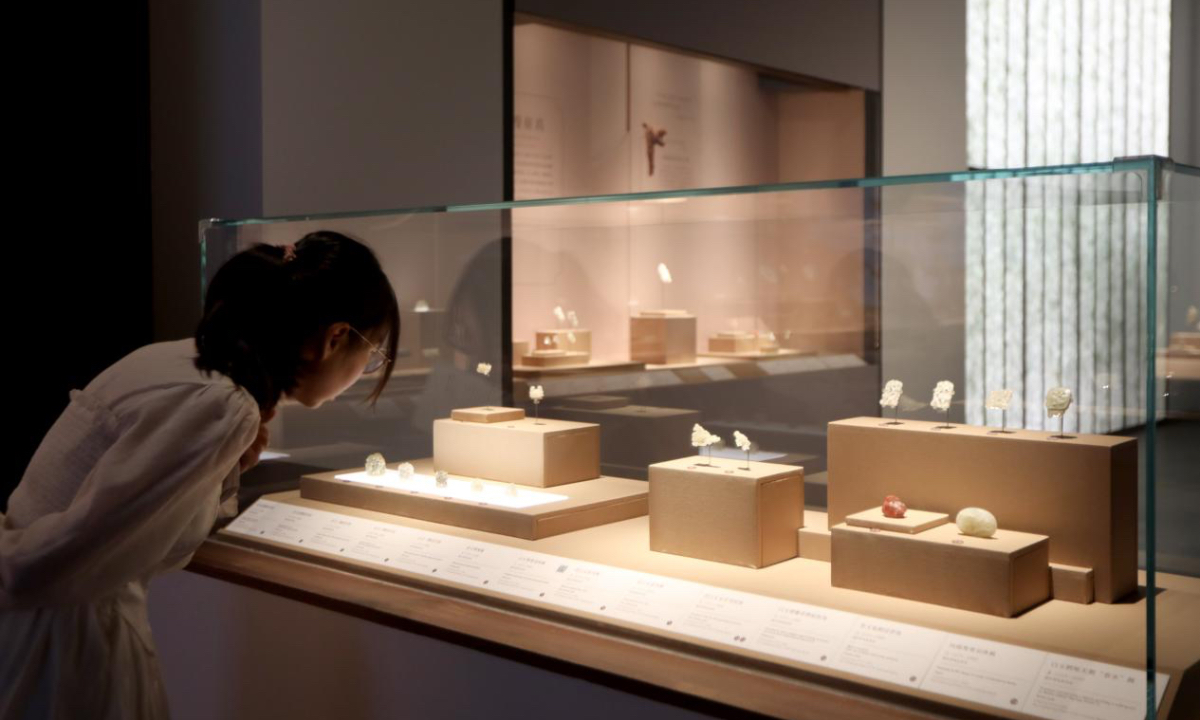
Photo: Chen Xia/GT
Usually seen as a modern metropolis, Shanghai also has a long history and a splendid ancient culture stretching back thousands of years. In the early 1990s, archaeological discoveries of numerous exquisite artifacts at Yuanying Pagoda, Shanghai’s tallest surviving ancient pagoda, amazed the public.
To mark the 30th anniversary of completing the architectural restoration and archaeological exploration of the pagoda, a new exhibition opened at Shanghai Museum on Wednesday, titled “A Towering Treasure House: Relics of the Yuanying Pagoda in Shanghai.”
The exhibition vividly shows the urban development, cultural vibrancy, and refined lifestyle of ancient Shanghai, with 300 of the cultural relics found in Yuanying Pagoda on show, including various kinds of Buddhist statues and daily necessities made of different materials, such as gold, silver, copper and jade.
“These artifacts provide a very good sample for us to study the social landscape, aesthetics, craft level, religious belief and folk customs of ancient Shanghai,” Chen Jie, deputy director of the museum, told the Global Times at the exhibition’s media preview on Tuesday.
The exhibition contains three major sections. The first section showcases the general archaeological achievements of Yuanying Pagoda.
The section displays Buddhist-themed objects that were discovered in the pagoda, such as statues and small pagodas, which “illuminate the unique cultural landscape formed during the Sinicization of Buddhism, and the wisdom of traditional Chinese culture in embracing harmony and inclusiveness,” according to the museum.
The third section takes visitors back to the lives of their ancient ancestors, with various everyday utensils, such as stationery, tableware, bronze mirrors, ornaments, and other handicrafts. Many of the exhibits in this section have delicate animal patterns, said the exhibition’s curator Rong Jingkan, from the mythological dragon, phoenix and chi (hornless dragon), to the fish and rabbit in real life.
Rong mentioned a coral pendant in the shape of a Makara (dragon-fish) from the Southern Song Dynasty (1127-1279), which was found in the underground palace of the Yuanying Pagoda.
“The coral pendant shows the craftsman’s sense of design,” he told the Global Times. “Based on the natural shape of the coral itself, he or she made some very elaborate designs, such as carving a dragon’s head from the thicker end. Moreover, corals come from the sea, and this pendant’s theme of fish and dragons echoes the sea as well.”
Originally built in 1388, Yuanying Pagoda is located in the current Songjiang district of Shanghai, one of the most populous and prosperous regions in the lower reaches of the Yangtze River in ancient times.
Over a thousand artifacts have been unearthed at the pagoda, spanning from the Southern Dynasties (420-589), via the Sui Dynasty (581-618), to the middle and late Qing Dynasty (1644-1911). The quantity and diversity of these relics are exceptional, Chen noted.
The exhibition is scheduled to run until November 11.




